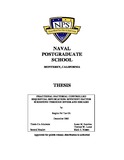Fractional factorial controlled sequential bifurcation efficient factor screening through divide and discard
| dc.contributor.advisor | Sanchez, Susan M. | |
| dc.contributor.advisor | Lucas, Thomas W. | |
| dc.contributor.author | Oh, Regine Pei Tze | |
| dc.date.accessioned | 2012-03-14T17:37:27Z | |
| dc.date.available | 2012-03-14T17:37:27Z | |
| dc.date.issued | 2007-12 | |
| dc.identifier.uri | https://hdl.handle.net/10945/3154 | |
| dc.description.abstract | On any given day, organizations use software simulations to make better decisions. Software simulations of real world systems are often large and rich with many parameters potentially affecting outcomes. Faced with a multitude of parameters, decision makers may not know or may lose sight of the few truly critical factors. Thus, screening algorithms are essential in order to identify the factors that most impact outcome measures. This enables experimenters to better utilize their resources by focusing on truly important factors. Fractional Factorial Controlled Sequential Bifurcation (FFCSB) is a newly proposed two-phase screening procedure for large-scale simulation experiments. This thesis evaluates the performance of FFCSB from accuracy and efficiency perspectives. FFCSB is also compared to existing algorithms, Controlled Sequential Bifurcation (CSB) and Fractional Factorial (FF), in order to understand the relative merits and weaknesses of each algorithm. FFCSB delivers consistent accuracy guarantees across more factor patterns and offers efficiency savings over CSB. FFCSB and FF are equally matched in accuracy; however, FFCSB is more robust to non-ideal settings of control parameters and scales better with increasing response model size; conversely FFCSB can be less efficient than FF. A first-case application of FFCSB on the Hierarchy organizational model yields results in agreement with prior research, as well as providing interesting hypotheses for further exploration. The Hierarchy model serves as a benchmark to compare innovative Command and Control structures for enabling more effective warfare. | en_US |
| dc.description.uri | http://archive.org/details/fractionalfactor109453154 | |
| dc.format.extent | xxviii, 82 p. ; | en_US |
| dc.publisher | Monterey California: Naval Postgraduate School | en_US |
| dc.subject.lcsh | Computer programs | en_US |
| dc.subject.lcsh | Algorithms | en_US |
| dc.subject.lcsh | Military art and science | en_US |
| dc.title | Fractional factorial controlled sequential bifurcation efficient factor screening through divide and discard | en_US |
| dc.type | Thesis | en_US |
| dc.contributor.secondreader | Nissen, Mark E. | |
| dc.contributor.corporate | Naval Postgraduate School (U.S.) | |
| dc.description.recognition | Outstanding Thesis | en_US |
| dc.description.service | Singapore DSO National Laboratories author (civilian). | en_US |
| dc.identifier.oclc | 191064689 | |
| etd.thesisdegree.name | M.S. | en_US |
| etd.thesisdegree.level | Masters | en_US |
| etd.thesisdegree.discipline | Operations Research | en_US |
| etd.thesisdegree.grantor | Naval Postgraduate School | en_US |
| etd.verified | no | en_US |
| dc.description.distributionstatement | Approved for public release; distribution is unlimited. |
Files in this item
This item appears in the following Collection(s)
-
1. Thesis and Dissertation Collection, all items
Publicly releasable NPS Theses, Dissertations, MBA Professional Reports, Joint Applied Projects, Systems Engineering Project Reports and other NPS degree-earning written works. -
2. NPS Outstanding Theses and Dissertations


